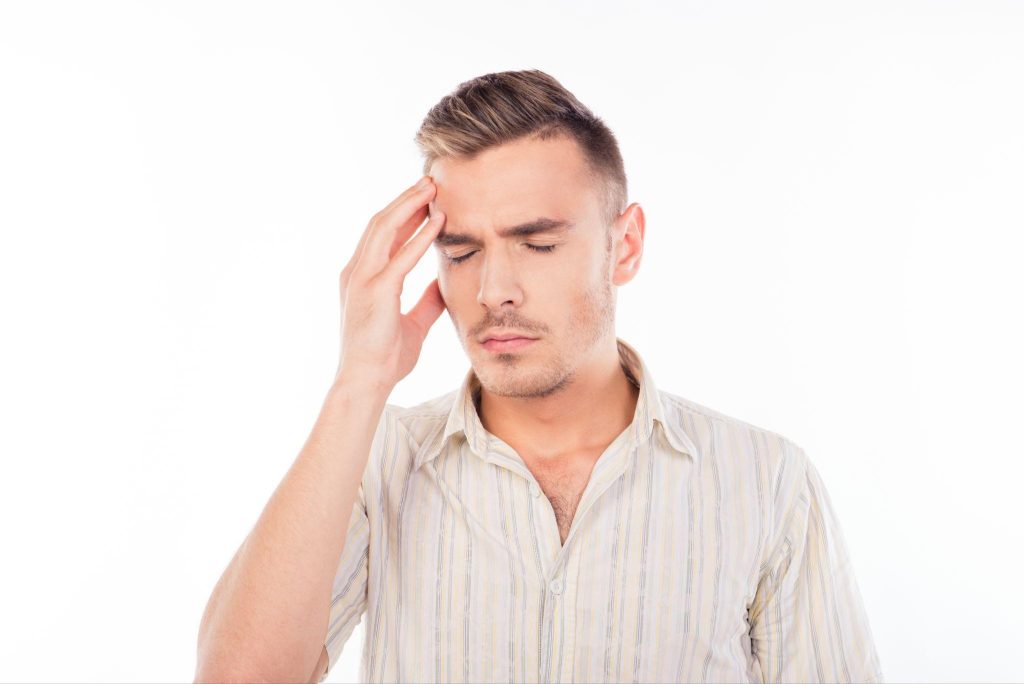LINK BETWEEN MIGRAINE AND STRESS

WHAT ARE THE SYMPTOMS & STAGES OF MIGRAINE?
1- Prodrome: The symptoms of a migraine often begin a day or two before the actual migraine attack, including.
- Fatigue
- Mood changes
- Muscle tenderness
- Light sensitivity
2- Aura:
- Seeing flashing lights, bright spots, or shapes
- Tingling in the face, arms, or legs
- Difficulty speaking
- Temporary loss of vision
3- Headache:
- Throbbing or pulsing head pain, often on one side of your head
- Nausea
- Vomiting
4- Postdrome: The final phase is called the postdrome phase. It can cause mood changes that range from feeling very happy to feeling tired and worn out. This phase is different for everyone; for some, it is accompanied by headaches, body pain, and brain fog before the distress is over.
CAN STRESS CAUSE MIGRAINE?
Emotional stress is one of the most commonly reported migraine triggers. It can lead to changes in brain chemistry and hormone levels, which may contribute to the onset of a migraine. People with high-stress levels are more likely to develop chronic migraine.
2021 data analysis screened over 2000 published records on the relationship between stress and migraine. It demonstrated a link between high stress loads from stressful life events, daily hassles, or other sources and the incidence of new-onset migraine. It highlights that major stressful life events seem to precede the transformation from episodic to chronic migraine and migraine symptoms increase in a setting of stress, often driven by a psychiatric comorbidity like depression or anxiety.
IS MIGRAINE CAUSING STRESS IN ME?
There is an unfortunate bidirectional relationship between stress and migraine. The deliberating symptoms of Migraines can also cause stress. The pain and recurrent attacks can lead to anxiety, , and social withdrawal, which further exacerbates the condition, often causing burnout. This cyclical relationship creates a challenging situation for many who suffer from migraines. The pain from the migraines induces stress, which can lead to further migraine attacks, perpetuating a vicious cycle that can be difficult to break. As a result, comprehensive management of both stress and migraine symptoms is essential for maintaining a better quality of life for those affected.
HOW TO COPE WITH STRESS-INDUCED MIGRAINE?
If stress triggers your migraine episodes, it's important to work on reducing or eliminating the source of that stress. Meditation and self-care measures can also provide relief from symptoms and help prevent or decrease the frequency of migraine attacks. If you're struggling to manage stress and it is a trigger for your migraines, consider speaking with a trained mental health professional. They can guide you through Cognitive Behavioral Therapy (CBT) and recommend effective coping strategies.
Maintaining a consistent sleep routine, engaging in regular exercise, and following a healthy diet are essential for keeping your body in good condition.
A 2023 study found that self-awareness, seeking social support, and overall psychological well-being can predict psychological resilience in patients with migraines. Interventions that aim to enhance psychological resilience & emotional intelligence emotional intelligence-17 are expected to improve the quality of life.
A WORD FROM MENTAL NURTURING:
Migraine is not just a headache; it is a debilitating condition characterized by intense, one-sided pain, often accompanied by distressing symptoms such as nausea, extreme sensitivity to light and sound etc. It is a long-term health issue that can affect the entire body and varies from person to person. Alarmingly, statistics show that 4 out of 5 individuals pinpoint stress as a significant trigger for these agonizing episodes. Moreover, migraines rank among the top ten neurological conditions contributing to disability among all age groups including children and adolescents.
The precise causes of this crippling condition remain largely a mystery, and the lack of effective treatment leaves many patients suffering for years, even decades. This enduring pain highlights the need for greater awareness, empathy and a prompt diagnosis. While some individuals find relief through stress management-oriented behavioral therapies, these should be strongly advocated as complementary options to pharmacological treatments. We must prioritize migraine research and support effective strategies to make it easier to open up about the concerns and break the stigma surrounding illness.
RESOURCES:
1. Kurtses Gürsoy B, Köseoğlu Toksoy C. Psychological Resilience and Stress Coping Styles in Migraine Patients. Neuropsychiatr Dis Treat. 2023 Jan 5;19:63-72. doi: 10.2147/NDT.S398838. PMID: 36636140; PMCID: PMC9830698.
2. Al-Quliti K. Stress and Its Correlates in Migraine-Headache Patients with a Family History of Migraine. Behav Sci (Basel). 2022 Mar 1;12(3):65. doi: 10.3390/bs12030065. PMID: 35323384; PMCID: PMC8945022.
3. Dominguez LJ, Veronese N, Sabico S, Al-Daghri NM, Barbagallo M. Magnesium and Migraine. Nutrients. 2025 Feb 18;17(4):725. doi: 10.3390/nu17040725. PMID: 40005053; PMCID: PMC11858643.
4. van Staveren I. Migraine and stress-an exploratory cross-country study of external stress factors. BMC Res Notes. 2021 May 8;14(1):174. doi: 10.1186/s13104-021-05587-8. PMID: 33964985; PMCID: PMC8105928.

Written by:
Dr.Sana Abdul Samad, M.B.B.S, MRCGP,
On May 31, 2025

